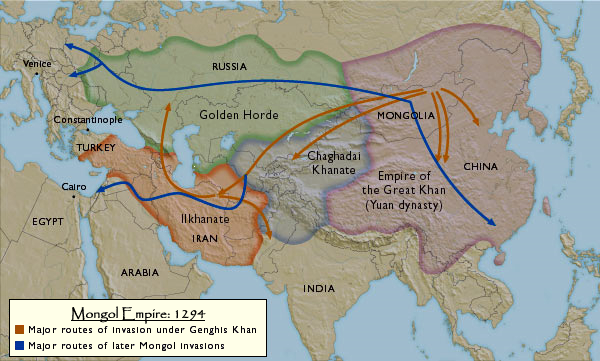The Mongols, a nomadic people from Central Asia. They established a vast empire that spanned from Asia to Eastern Europe during the 13th and 14th centuries. They were famous for their military prowess, fierce fighting skills, and unique nomadic way of life.
Genghis Khan led the Mongols in conquering a significant portion of the Eurasian continent, including parts of China, Russia, and Persia. They utilised mounted archers who could manoeuvre quickly across the battlefield to attack their enemies with deadly precision.

Despite their brutal and destructive reputation, the Mongols made significant cultural and technological advancements. They promoted religious freedom and tolerance, and facilitated trade along the Silk Road. This brought goods and ideas from Asia to Europe and vice versa.
Internal conflicts, overextension, and the emergence of new powers eventually led to the decline of the Mongol Empire. However, their impact on world history remains significant, leaving a lasting legacy in areas such as language, culture, and politics.
Decline Of Buddhism Amongst Mongols
During the early years of the Mongol Empire, Buddhism held a prominent position among the Mongols. Many Mongol leaders, including Genghis Khan, were known for their tolerance of different religious beliefs and practices, and they supported the spread of Buddhism throughout their empire.
However, over time, the Mongols began to change their attitude towards Buddhism. As they became more involved in trade and politics, they started to adopt the religions of the regions they conquered.
Many Mongols converted to Islam, and by the end of the 14th century, Buddhism had significantly declined in Mongolia.
The decline of Buddhism among the Mongols was also influenced by internal political and social factors. The Mongol Empire became increasingly divided, and different factions competed for power and influence. This led to a decrease in support for Buddhism, as different leaders and groups favoured various religions and ideologies.
Rise Of Islam Amongst Mongols
In the 13th century, the Mongol Empire expanded into Muslim territories, including parts of Iran and Iraq, which led to the rise of Islam among the Mongols. The Mongol rulers demonstrated tolerance towards the religion of their subjects, and many Mongols converted to Islam due to political and social pressures or voluntarily.

The spread of Islam among the Mongols was facilitated by Persian and Arab scholars and theologians who held important positions in the Mongol court. These scholars played a crucial role in introducing Islam to the Mongols and shaping their understanding of the religion.
Additionally, the need for a unifying ideology in a rapidly expanding empire with diverse ethnic and religious groups was another factor that contributed to the rise of Islam among the Mongols. Islam provided a common religious and cultural identity that helped to unite different groups under the Mongol rule.
The adoption of Islam by the Mongols had a significant impact on the religion itself. It resulted in the formation of new schools of Islamic thought, such as the Chagatai and the Ilkhanid schools, which blended Islamic teachings with Mongol culture and traditions. The Mongols also supported the construction of mosques, madrasas, and other Islamic institutions, which helped to spread the religion further.
Bloodshed For Islam

The Mongols engaged in conflicts and bloodshed during the spread of Islam among their empire. Under the Ilkhanate rulers, there were tensions and military campaigns between the Muslim and non-Muslim populations. The Ilkhanids converted to Islam and enforced Islamic laws, adding to the tension. One of the most significant instances of bloodshed related to Islam among the Mongols was the massacre of the Ismaili Shia community in Iran’s Alamut region. In 1256, the Mongol ruler Hulagu Khan killed many Ismaili Muslims during the attack on the Ismaili fortress.
The Mongols left a significant impact on world history by establishing one of the largest and most powerful empires. While Buddhism declined, Islam gained ground and played a role in shaping the religion itself. It started with bloodshed and continued so with their successors eventually looting, raiding and setting their shop in India eventually.


